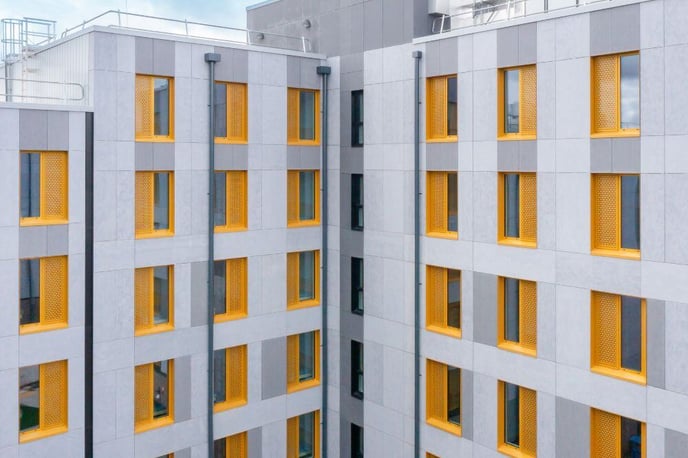Why is rainscreen cladding a popular choice for student accommodation?
Rainscreen cladding offers a combination of durability, safety, and cost-effectiveness for large-scale developments such as student housing.

In a nutshell:
• Universities face pressures to provide large-scale accommodation blocks that are modern and sustainable.
• Rainscreen cladding protects the inner building structure from water damage, prolonging its lifespan.
• The insulation layer within rainscreen cladding improves thermal efficiency and reduces heating demands.
• The build-up of rainscreen cladding systems also blocks sound waves to reduce disturbance in busy urban areas.
• Rainscreen cladding systems meet regulatory fire standards and help to prevent fire spread.
• As well as practicality, aesthetic aims can be met thanks to the range of materials available for rainscreen cladding.
In 2022 it was reported that nearly 3 million students in the UK enrolled at universities, which is a staggering amount of people who require modern, comfortable accommodation. In addition to catering to the needs of millions of students, large institutions such as universities also face pressures to meet sustainability targets that align with the government’s net-zero targets. With mounting expectations such as these, university housing providers must find options that satisfy a variety of needs, which is where rainscreen cladding can help.
Enhanced Weather Protection
Rainscreen cladding acts as an additional protective barrier, allowing moisture to drain and evaporate before reaching the inner building structure. This protects the building envelope from water damage, prolonging its life and reducing maintenance needs—ideal for buildings expected to see heavy use and minimal upkeep over time.
Thermal Efficiency
Heating numerous accommodation blocks requires a lot of energy resulting in hefty heating bills and increased CO2 emissions. Rainscreen cladding includes an insulation layer, which improves energy efficiency and helps maintain a comfortable indoor environment making it an attractive feature for universities and developers alike.
Acoustic Benefits
Student accommodation is often situated in city centres meaning that busy urban life can cause a disturbance for students. Rainscreen cladding can help alleviate this issue as the cladding material, along with the air gap between it and the building’s structural wall, acts as a barrier to sound waves and buffers noise from outside. This makes it easier to create quieter, more comfortable living spaces.
Fire Safety Compliance
The build-up of a rainscreen cladding system has been designed to meet stringent fire safety standards and can help to prevent fire spread which is essential for student accommodations. By using fire-resistant materials, rainscreen cladding can contribute to a safer living environment.
Aesthetic Flexibility
Rainscreen cladding comes in a variety of materials, colours, and finishes, making it versatile for achieving different design goals. Universities often want distinctive and visually appealing buildings that contribute to campus identity, and rainscreen cladding offers the flexibility to create unique and attractive façades.